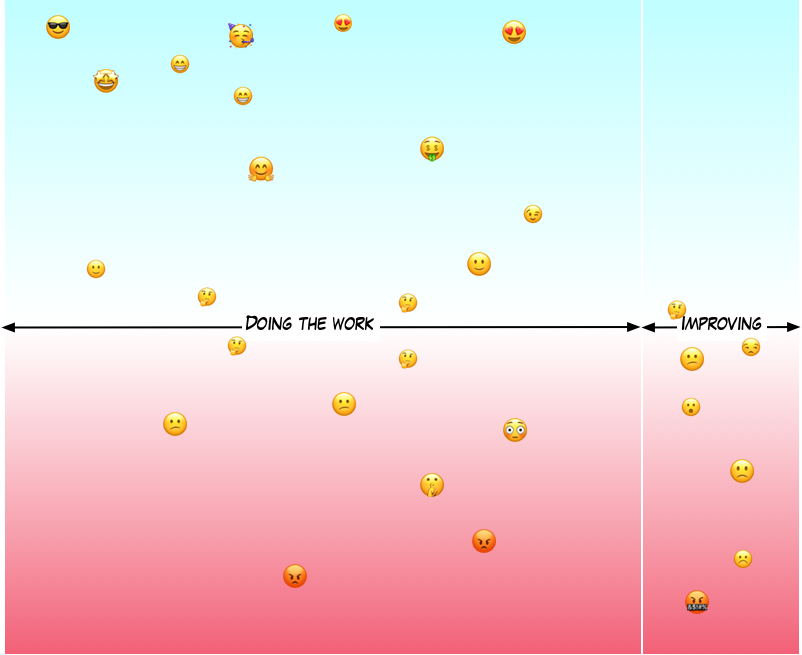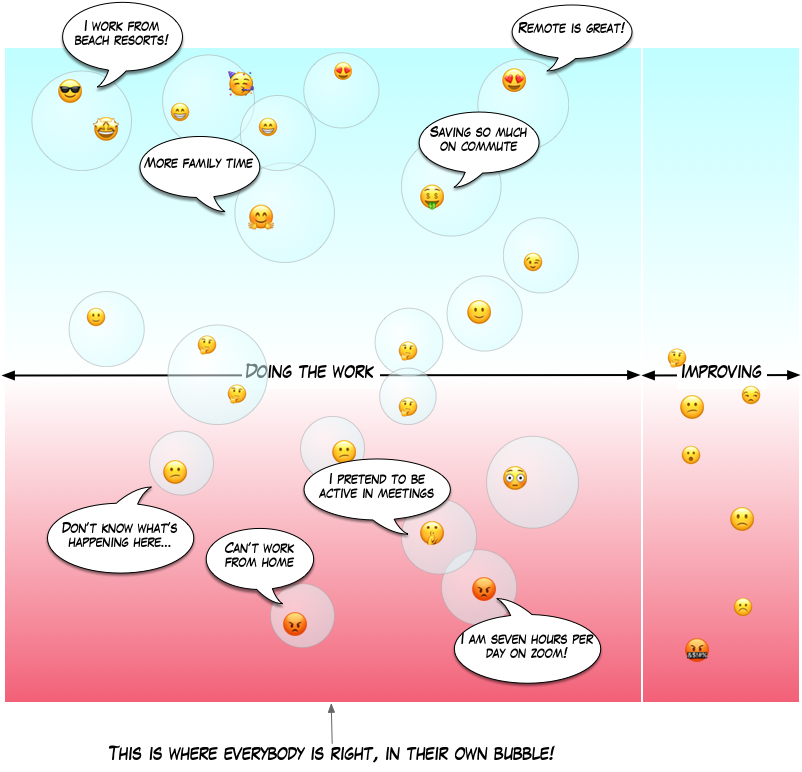Remote work is fooling you
We’ve been into remote working for years now. It started as a smart alternative played by some niche organisations; it became the de facto standard for many organisations during the Covid-19 pandemic and became a mainstream possibility after the restrictions were lifted.
In the meantime, companies and teams learnt how to use different tools in their jobs. Technology was a strategic enabler for these new ways of working, providing better tools for collaboration and coordination in a market that boomed in size.
Remote work shouldn’t be an interesting topic anymore. It’s normal. It’s boring.
Except, something isn't quite right. Organisations aren't settling on a new paradigm and trying to roll back the change. Others embraced the new paradigm, but they're turning into something different. Something isn't yet working as it should, and it’s hard to pinpoint exactly what’s wrong.
For me, it all started with a feeling of growing dissatisfaction. We deliberately moved to remote work before the COVID-19 pandemic, and when the world was forced into the new standard, we were already prepared.
Slowly, things started to worsen. Solving non-trivial problems started taking longer than usual. Meetings were more likely to turn out inconclusive, and the team inertia was growing. We were still a small company, but changes were slower. And everything was so boring.
Consulting for clients wasn’t much better. Despite preparation efforts and multimedia support, online meetings weren’t effective. Ideas weren’t landing as they used to be. Conversations weren’t so actionable.
I started investigating the matter a little better as a systemic issue, trying to move beyond the mainstream narrative. I knew what an effective organisation tasted like, and we were shifting from grandma’s recipe to microwave food.
What I discovered wasn’t nice. The long-term consequences of remote work were stiffening my company, but we weren’t alone. Remote work introduced new habits, tools, and constraints that progressively turned from reasonable choices into addictions. And this was happening everywhere.
Remote work is undermining the organisation’s ability to evolve. And it has very little to do with us. It's a systemic problem that in most cases doesn't have a valid solution. I guess I need to provide some more background.
It's not only about work
When talking about remote work, we reasonably focus on the most visible part of the work. Software developers can probably code more effectively from home than from an office where they must wear noise-cancelling headphones. But that’s only one side of the work.
An evolving team or organisation must balance their focus between doing today’s job well and improving to be better tomorrow. One more version of the chicken and egg problem.
If we split remote problem work into these two perspectives, we can have many context-dependent narratives about the impact of remote work on business as usual; it’s very hard to find positive narratives about the current ability of organisations to evolve and reinvent themselves.
Diagnosing problems, designing solutions, building consensus, and implementing changes all seem to take more time and energy and be less effective.

Not every organisation needs to evolve at the same pace. Some industries evolve faster than others, and often, you only need not be as fast as your slow competitors to survive. But few have the privilege of deciding when they need to change. The world outside does, and now AI is spurring a new wave of transformation before you completed the previous one.
While we progressively discovered ways to perform complex tasks and deliver value remotely, we still haven’t found a decent solution to vital issues like onboarding juniors and building trust.
Have you tried …?
Meanwhile, we underestimated the consequences of the countermeasures we found to enable remote work. Online meetings can be almost as good as the in-person version and even more convenient if they involve travel. Still, they deplete brain energy faster and are more prone to dysfunction and uselessness. There’s less bandwidth in a remote meeting. You can’t kick your colleague’s leg under the table to stop them from saying something inconvenient, or you can’t offer homemade snacks to create a friendly atmosphere.
The most severe blow to the remote organisation ecosystem involves transparency and trust.
No matter how much you share on the company wiki, something will still not be visible. And no matter how much you invest in corporate retreats and team-building moments, trust will be built slowly and eroded faster in a remote organisation.
We got rid of the embarrassing motivational posters from the eighties, and that’s a plus. But we also severely harmed the observability of our work and the effectiveness of key practices like leading by example, Gemba, inspect and adapt and so on without finding a valid replacement.
Trust is probably the most critical issue. It is harder to build trust remotely and easier to lose it. Many organisations that turned remote didn’t realise they were running on a trust capital they accumulated in the past but could not find good ways to replenish it. They put hope in team-building events, inflating the expectations for corporate retreats in fancy locations, often with disappointing results.
Technology isn’t the solution
Technology has been a fantastic enabler for remote work. Cloud services make it possible to coordinate a distributed team without being colocated. Tools like Zoom and Miro’s relentless effort to improve their user experience make the interaction better and better. Chapeau!
But are the tools good enough? No, they’re not. Online meetings are still an intrinsically depressing experience, no matter how good your background image, microphone, or light. Online modelling will inevitably be less interactive than being in the same room with a good whiteboard, markers, and an engaged audience.
Almost is the keyword here. Online tools can give you almost what you need; this gap will make all the difference.
Technology is also taking something back: you must build templates for your Miro boards supporting critical meetings. More and more meetings will need active facilitation and precise time management. This doesn’t happen for free: extra time will be needed for preparation, but more importantly, extra attention will be needed to keep everything under control in a remote setting.
I said attention. But I could have said brain energy. Online tools are depleting our brains faster. Our minds more easily wander around in a boring meeting, and we’re spending an extra amount of free will, forcing ourselves to be focused.
“Am I boring you?”
“Yes, but it’s not personal. It’s the format.”
Free will, focus and intentionality are not free meals. They are the scarcest resources in a world continuously craving your attention, and we are consuming them faster.
This is not my experience!
I have no idea about your overall experience with remote work. Maybe it’s working for you, or maybe you think it’s working for now. I am reading signals and connecting dots; many signals point in the same direction. And this direction is scary.
There are exceptions. I know of organisations that were designed around the notion of remote work and that were successful this way. It may be interesting to explore their recipe to understand whether it is truly replicable.
Others were only temporarily successful, like Nassim Taleb’s turkey, which reported receiving free meals every day until Thanksgiving.
On this topic, context is more important than ever. Company size, industry, working relationship, role, country, market, and so on affect how remote work impacts the ecosystem. Every ecosystem is different, and our experience can only tell us so much. This obviously affects me as well.
While biases are true for many problems, remote work affects our perception, reducing visibility and, ultimately, the perception of system-level problems.
Using only your personal experience to discuss remote work is like assessing that you’re funny after drinking a bottle of wine.
You are not the one to ask.
Remote fragmented the work ecosystem into many unique bubbles. Your remote is not my remote. We think we’re discussing the same thing, but we’re not.
No quality conversation
Talking about remote work is hard. Raising the topic in a normal setting often lowers the level of the conversation. Since everybody has tasted remote work, everybody feels entitled to join the conversation without realising we are coming from many different bubbles.
The rush to remote work during the 2020 lockdowns had the side effect of synchronising the remote clock for too many organisations. Remote was already there, with its hype cycle, early adopters, etc. The moment remote became a global issue, everybody joined the conversation simultaneously, ready or not.
Some of this conversation became global, with the feeling that “we are in this together.” Boundaries disappeared, and terms became blurred. Newsmagazines spread watered-down descriptions, and legislators added their contributions. “Smart Working” (in English) is an official way to designate remote work contracts for Italian employees.
Remote work also affected workers’ lives in hardly reversible ways. Moving from a really expensive neighbourhood to a more affordable one and establishing a better financial status, work-life balance, and family routines isn’t something to give up without fighting.
So, touching this nerve often makes the conversation emotionally harder to manage. Even worse, some organisations (context, again) took the hard stance of forcing employees back to the office, making remote work look like a third-millennium class struggle.

Talking rationally about a complex problem that is heavily context-dependent and has massive emotional strings attached seems like a recipe for disaster. And it often is. Most conversations I had didn’t end well. They quickly leaned into the left side of this spectrum, where for every problem raised, there is a balancing narrative stating that "It works for us", dragging the conversation into the inconclusive space.
I felt stressed, angry, and sometimes cheated. I was flooded with fallacies, biases and emotional overload, but I had very few truly challenging arguments. I knew it would happen, but is this a good reason not to point at the iceberg?
Remote is here to stay
Typically, this is where somebody plays a straw man argument like: “So you’re suggesting to go back to the office? I am not. I am pointing at a complex, underestimated problem, and the solution won’t be as easy as a catchphrase.
We discovered that the office routine was based on a weak assumption: “The office is the workplace.” The moment the assumption was invalidated, the system became unstable, and irreversible changes happened. Some locations were dismissed, and restaurants and pubs in office areas closed because of reduced business.
Choosing individually to return to the office won’t give the expected results if your colleagues aren’t there too. You’ll be trapped in hybrid-remote rituals even if you’re physically there. Making Zoom calls instead of going to the upper floor. Remote poked a bubble.There is no rewind button, and I am not looking for it.
What's next?
As I said earlier, I am reading signals and connecting dots. I am trying to have a meaningful conversation and warn you about a potential threat. I started talking about these problems a while ago, but started connecting more and more dots while preparing my keynote speech at XP2024 conference in Bolzano.
That gave me momentum, and led me to discover some more evidences and dots to connect. Too much for a single blog post, the plan is to build a more articulated narrative and see where it leads me. More posts coming!
